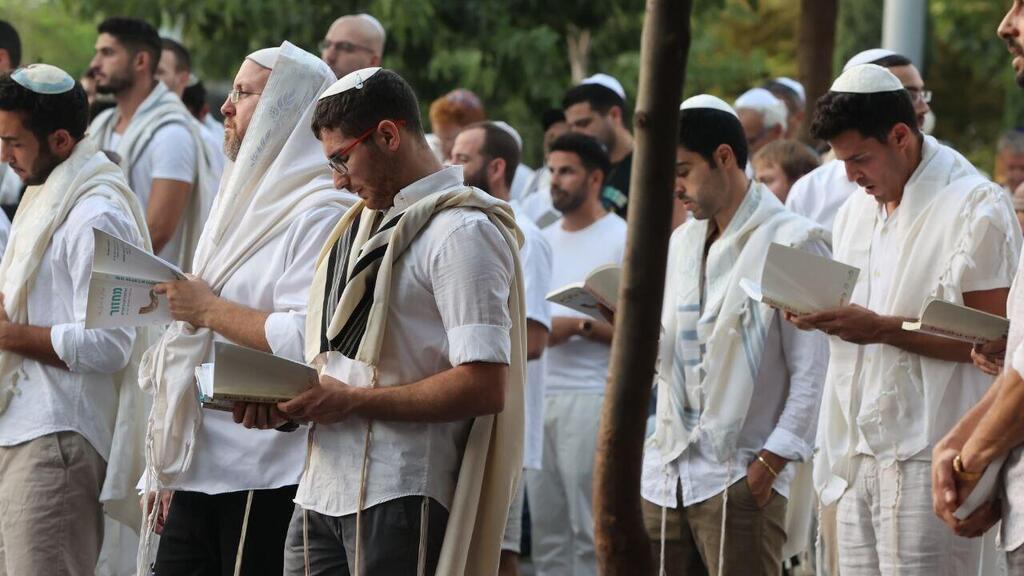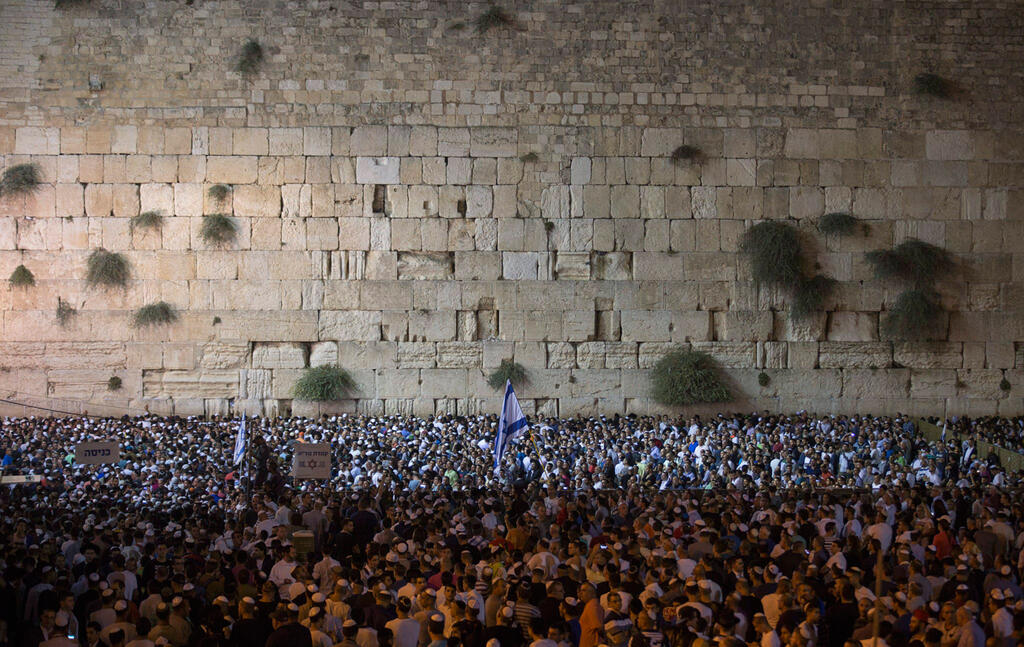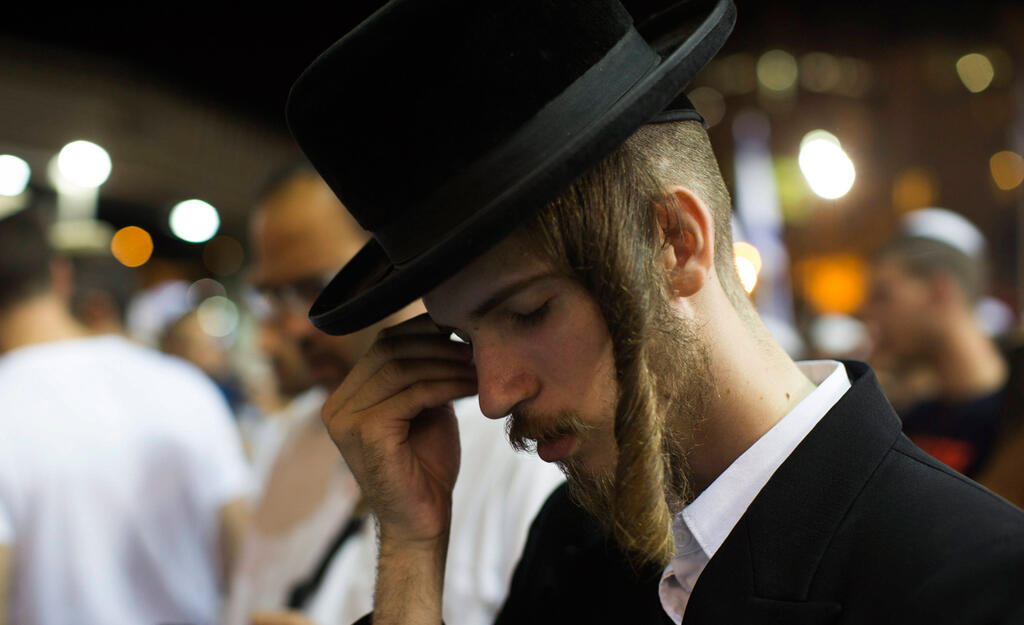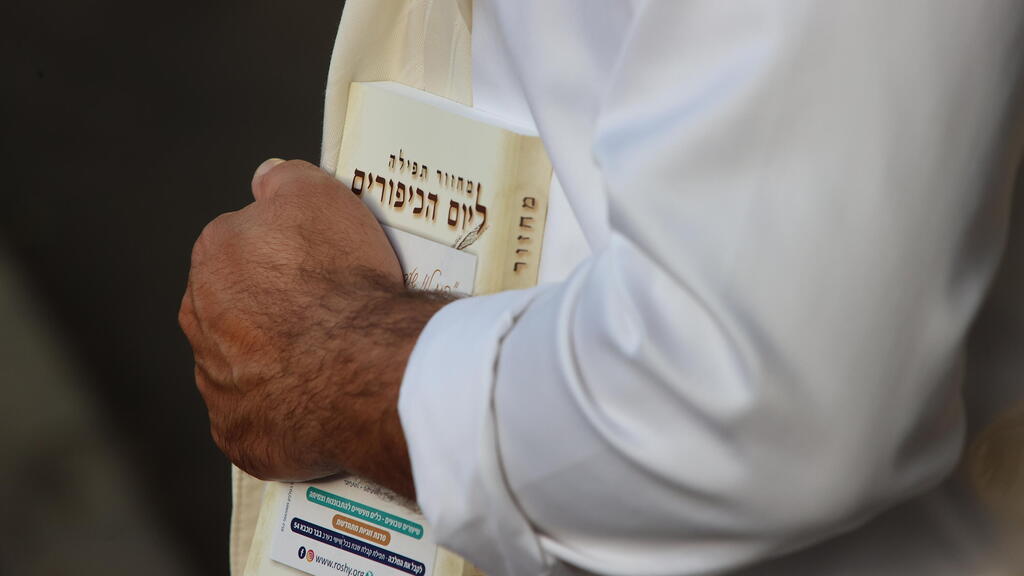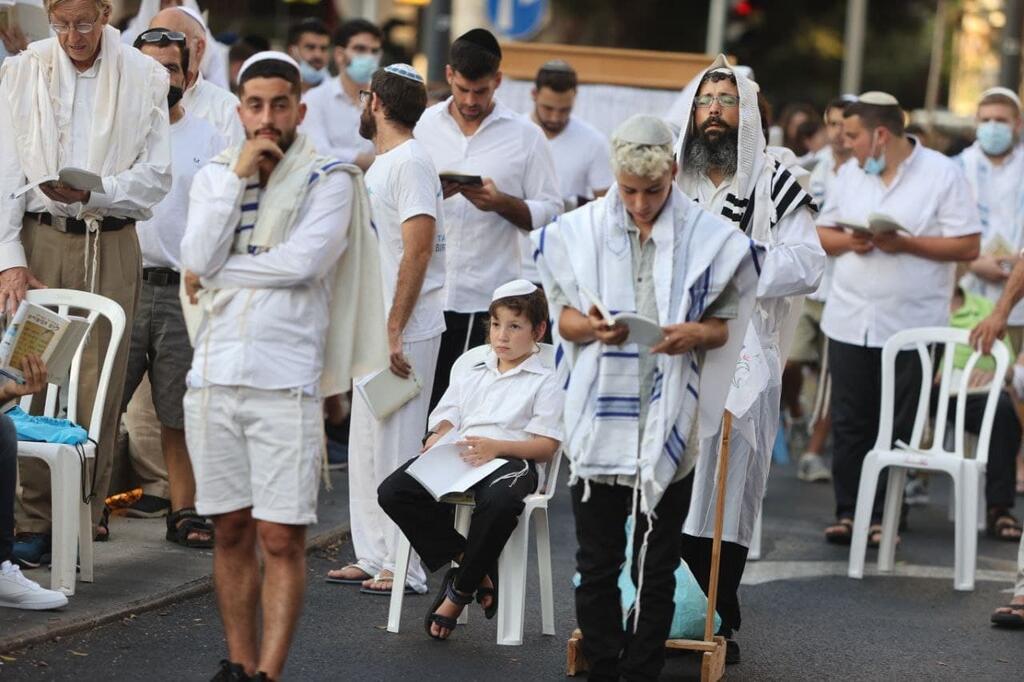Getting your Trinity Audio player ready...
The holiest day in Judaism, Yom Kippur—or the Day of Atonement—is the day on the Jewish calendar when one must repent of one's sins from the past year before one's fate is decided for the upcoming year. It is traditionally observed by 25 hours of fasting and intensive prayer.
The Day of Atonement
The purpose of Yom Kippur is clearly outlined in the Torah portion Acharei Mot (Vayikra 16: 29-30):
“And this shall be to you a law for all time: In the seventh month, on the tenth day of the month, you shall afflict yourselves, and you not do any work neither the native nor the stranger who dwells among you. For on this day, He shall effect atonement for you to cleanse you. Before G-d, you shall be cleansed from all your sins.”
Over 2 million people participated in Selichot at the Western Wall during the month of Elul and the Ten Days of Repentance
(The Western Wall Heritage Foundation)
The Torah establishes that the Day of Atonement serves as a means of seeking atonement for sins and this fundamental purpose shapes the essence of the day. Rambam (“Maimonides”) in “The Laws of Teshuvah” (2:7) describes Yom Kippur as “a time of Teshuvah (repentance) for all, both individuals and the community at large. It is the apex of forgiveness and pardon for Israel. Accordingly, everyone is obligated to repent and confess on Yom Kippur."
Seeking and granting forgiveness
Yom Kippur is a day of forgiveness. It is the day that G-d forgave the people of Israel, and it is essential to understand how to seek forgiveness and extend it to others. In this process, G-d operates on a principle of measure for measure. If an individual has not sought forgiveness from his fellow man for Mitzvot Bein Adam Le-Chavero (interpersonal matters), it means that no atonement is granted for matters Bein Adam La-Makom (between a person and G-d) This principle is illuminated in “Fear of Isaac” by Rabbi Yitzchok Hutner. The reason is that one cannot stand before G-d in an impure state.
Should the offended party decline forgiveness, even after three attempts at reconciliation, we are not obligated to further efforts (Shulchan Aruch Siman 606). However, one may still choose to pursue reconciliation if they wish to do so.
Is it right to seek forgiveness from a friend who does not even know about the sin?
There can be a dilemma when one has wronged a friend, but the friend is unaware of the wrongdoing, such as speaking ill of them. In such cases, should you ask for forgiveness, potentially causing your friend distress by revealing the offense, or should you stay silent to avoid hurting them? This issue has been debated among scholars.
The Chofetz Chaim (5:12) advises that if people did not believe the negative talk about your friend, you should not inform your friend about it. Instead, you should privately feel remorse and commit to not repeating such behavior.
However, if our actions led to real harm, either by damaging your friend’s reputation or causing emotional, physical or financial harm, it is necessary to approach your friend and seek forgiveness, even if it might upset them further. This is because rectifying the situation and making amends takes precedence in such cases.
Indeed, Rabbi Israel Salanter (Moadim Uzmanim Part 1:54; Oz Nedabru 7:66) believed that in situations where your friend is unaware of any harm done, you should approach the matter carefully. It’s possible that up to that point your friend had not experienced any distress, and seeking forgiveness might actually cause more harm. In such cases, it may be wiser to repent privately in your heart rather than upsetting your friend.
It seems that in this case, it is worthwhile to praise your friend occasionally in front of others. By doing so, you can gradually mend the negative impression on this person (even simple compliments in the presence of others can boost your friend’s esteem and contribute to reconciliation.
Eating on the eve of Yom Kippur
In preparation for Yom Kippur, the sages emphasize the importance of eating on the ninth day of the Hebrew month of Tishrei (the eve of Yom Kippur). This tradition is derived from a careful reading of verses, which suggest that one should eat on the ninth day and then afflict themselves on the tenth: "One who eats and drinks on the ninth day of Tishrei in preparation for the fast the next day, the verse ascribes him credit as if he fasted on both the ninth and the tenth of Tishrei (Berakhot 8b:3).
According to the Tur (Orach Chaim 604), a code of Jewish law by Yaakov ben Asher, this practice is rooted in the idea that G-d’s great love for His people motivates this instruction. By eating on the ninth day, we are given the strength to successfully observe Yom Kippur's fast.
It’s worth noting that the ninth day is considered a Yom Tov (see Rabbeinu Yonah, Berachot 8:52). This is because God’s love for us is expressed through His desire for us to approach Yom Kippur with the strength to stand before Him, engage in self-reflection and seek atonement. Sometimes, serving G-d involves eating, while other times it involves abstaining from food.
Lighting candles on the eve of Yom Kippur
The Mishna Pesachim (4:4) indicates that some people used to light candles on the eve of Yom Kippur while others did not. In any case, today it has become a tradition and the blessing recited is: “Baruch ata Hashem Elokeinu Melech ha-olam, asher kideshanu be-mitzvotav ve-tzivanu le-hadlik ner shel Yom Ha-Kippurim.” This year, Yom Kippur is scheduled on Shabat, therefore the blessing recited is: “Baruch ata Hashem Elokeinu Melech ha-olam, asher kideshanu be-mitzvotav ve-tzivanu le-hadlik ner shel Shabat veshel Yom Ha-Kippurim.”
7 View gallery
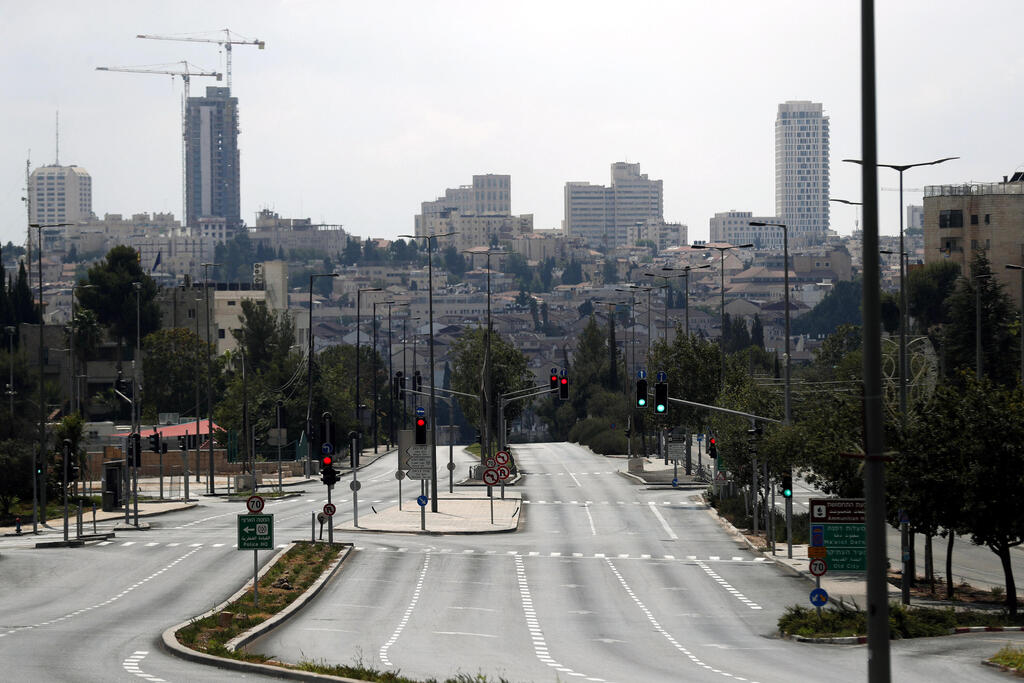

A view of empty blocked roads during the Jewish Holiday of Yom Kippur in Jerusalem, September 16, 2021
(Photo: EPA)
Immediately after lighting the candles, women recite the She-hecheyanu blessing. The primary blessing of She-hecheyanu is for the arrival of the day of Yom Kippur itself, not specifically for the act of lighting the candles. Therefore, if a woman has already said She-hecheyanu while lighting the candles, she should not repeat it when joining the congregation in the synagogue. Instead, she should respond with “Amen” only. (Sha’ar Hatziyum 619:7).
It is also advisable to remove leather shoes before lighting the candles. This is because during the recitation of She-hecheyanu, the holiness of Yom Kippur is recognized, and traditionally, leather shoes are not worn on this sacred day.
For men, it is customary to wrap themselves in a Talit, or prayer shawl, before sunset. If there are uncertainties about whether the sun has set, one can still recite blessings. However, after the doubt has been resolved, it is recommended not to repeat the blessings (Mishnah Berurah 619:4).
Yom Kippur prohibitions
The Torah outlines the specific commandments and prohibitions for Yom Kippur: "Mark the tenth day of this seventh month as the Day of Atonement. It shall be a sacred occasion for you: you shall practice self-denial, and you shall bring an offering by fire to G-d; you shall do no work throughout that day. For it is a Day of Atonement, on which expiation is made on your behalf before your G-d.”
From these verses, we learn that on Yom Kippur we are commanded to afflict ourselves, and just like on Shabbat, any form of Melacha, activities prohibited on Shabbat, is prohibited. This includes Melechet Ochel Nefesh, or work required to prepare food, which is allowed on other holidays. The sages in Mishna Yoma (8:1) indicated that there are five prohibitions on Yom Kippur: “[On] Yom Kippur eating, drinking, washing, anointing, wearing shoes and cohabitation are prohibited."
Fasting and medication on Yom Kippur for the sick
May I take a medication that eases fasting (such as “Kalitzom”) before Yom Kippur?
It is permissible to take medication that eases the challenges of fasting before Yom Kippur. While fasting is a central aspect of Yom Kippur, there is no obligation to suffer. Healthy individuals who can fast comfortably may choose not to take such medication. (Minchas Shlomo Vol. 2 58;25).
What does a sick or ill person do in Yom Kippur?
If a person is a choleh sheyesh bo sakanah (suffering from a life-threatening illness), it is forbidden for them to fast. Even if there is doubt about their ability to fast safely, it is recommended not to fast.
Consulting with a knowledgeable authority (rabbi) in such situations is advisable. If this is not possible, and there is real doubt, we must refrain from fasting and not bring ourselves to a situation that could endanger our lives, even if the danger is not immediate. A sick or ill person should not risk fasting contrary to his doctor’s instructions.
While some individuals may wish to be stringent and attempt to fast despite medical concerns, this is discouraged. The principle “I will demand your blood for your souls” emphasizes that endangering one’s life is not in line with the Jewish Law (Mishnah Berurah 618:5).
Pray or eat?
When it comes to fasting on Yom Kippur, health considerations take precedence. If walking to the synagogue is too strenuous and causes a person to be unable to fast, it is better to prioritize fasting and forgo walking to the synagogue. It is better to give up going to the synagogue even for a one-time drink le’shiurim (small bits at a time). It is better for a person to rest all of Yom Kippur and pray according to his abilities, and not give up fasting, since fasting is a Torah rule and is liable for Karet, the biblical punishment of a shortened life.
What should be recited for eating and drinking le’shiurim (small bits at a time)?
When consuming food or drink in small portions on Yom Kippur, it is sufficient to recite the first blessing before the first bite or sip (unless in between the eating, there is a prolonged pause and a distraction). A blessing afterward is not recited for eating or drinking in small increments.
Can we shower?
If taking a shower is necessary for one’s physical recovery, it is permitted on Yom Kippur. This allowance extends to situations where a person is not in a life-threatening condition. Showering for health reasons is preferable over eating or drinking and aligns with Jewish Law (Rema 613:9; Shulchan Aruch, Orach Chayim 613:9).
Seeking G-d’s forgiveness
How do we approach seeking G-d’s forgiveness?
Attributes of G-d: We are encouraged to emulate the attributes of G-d by being compassionate, merciful and forgiving toward others. Just as we hope for G-d’s forgiveness, we should also extend forgiveness to those who may have wronged us.
Prayer and repentance: When we find ourselves in times of difficulty and distress, we turn to prayer and seek G-d’s mercy. But on regular days, we take for granted all the good that surrounds us, as if we are entitled to it. Do we really deserve this abundance? It seems we are not perfect, and we don’t deserve everything. Yet G-d does not penalize us, but instead believes in us, and offers us opportunities for growth, improvement and forgiveness.
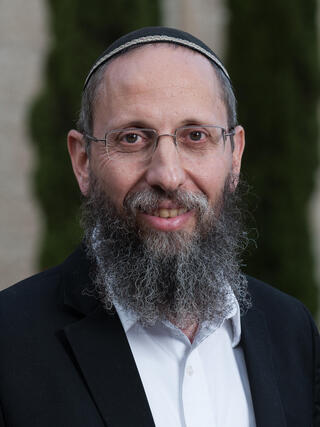 Rabbi Yossef Tzvi RimonPhoto: Yehoshua Halevi
Rabbi Yossef Tzvi RimonPhoto: Yehoshua HaleviAs we approach Yom Kippur, we pray for a good and joyful year. We ask G-d to not be harsh with us and grant us our heartfelt wishes for the best, seeking a year filled with blessings and opportunities for spiritual growth.
Wishing everyone a Gmar Chatimah Tova!
- Rabbi Rimon is the rabbinic head of the Jerusalem College of Technology and the head of its Batei Midrash and serves as the rabbi of the Gush Etzion Regional Council
Get the Ynetnews app on your smartphone:
First published: 22:30, 09.23.23






